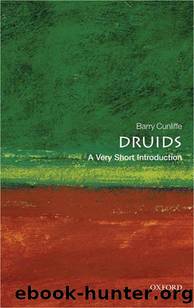Druids by Barry Cunliffe

Author:Barry Cunliffe [Cunliffe, Barry]
Language: eng
Format: epub
ISBN: 9780199539406
Publisher: Oxford University Press
Published: 2010-08-23T01:00:00+00:00
They are believed to be the most just of men and are therefore entrusted with the decision of cases affecting either individuals or the public; indeed in former times they arbitrated in war and brought to a standstill the opponents when about to draw up in line; and murder cases have been mostly entrusted to their decision.
He concludes with a general observation that they believe the souls of men to be indestructible.
Diodorus, presumably using the same Posidonian text as Strabo, offers a little more detail. The Bards, he says, are lyric poets: âThey sing to the accompaniment of instruments resembling lyres, sometimes a eulogy and sometimes a satire.â The second class, the Vates (whom Diodorus calls âseersâ), are men thought to be âworthy of high praiseâ who, âby their augural observances and by the sacrifice of sacrificial animals can foretell the future and they hold all the people subject to themâ. Then there are the Druids, âphilosophers and theologians who are treated with special honourâ. He goes on to say that no-one would offer sacrifice without a philosopher being present since only a philosopher can communicate with the gods. The description ends with a comment about how they can intercede to stop battles, concluding âThus even among the most savage barbarians anger yields to wisdomâ â a nice evocation of the ânoble savageâ.
This same tripartite division of wise men is also echoed by the late 4th-century AD writer Ammianus Marcellinus whose source was the 1st-century AD Alexandrian historian Timagenes. Timagenes, like Strabo and Diodorus, may also have derived his knowledge of the Celts from Posidonius.
The Posidonian tradition, then, makes a clear distinction between the three classes of wise men. It is a distinction that we will see later in the Irish vernacular texts, in which the three classes are named as baird, filidh, and druïdh. The distinction between the Vates and Druids is worth emphasizing. The Vates were those with powers to foretell the future through augury and whose duties included carrying out the sacrifices. They were directly equivalent to the haruspices of the Etruscans and Romans. The Druids, on the other hand, were the philosophers and the intermediaries between man and the gods, as well as being the ultimate justices and being skilled in âthe science of natureâ.
Diodorus adds further details about the Vates:
Download
This site does not store any files on its server. We only index and link to content provided by other sites. Please contact the content providers to delete copyright contents if any and email us, we'll remove relevant links or contents immediately.
Becoming Supernatural by Dr. Joe Dispenza(7120)
Tools of Titans by Timothy Ferriss(6964)
The Witchcraft of Salem Village by Shirley Jackson(6587)
Inner Engineering: A Yogi's Guide to Joy by Sadhguru(5910)
The Four Agreements by Don Miguel Ruiz(5531)
The Power of Now: A Guide to Spiritual Enlightenment by Eckhart Tolle(4767)
The Wisdom of Sundays by Oprah Winfrey(4632)
Room 212 by Kate Stewart(4114)
Fear by Osho(4094)
Pale Blue Dot by Carl Sagan(4017)
The David Icke Guide to the Global Conspiracy (and how to end it) by David Icke(3891)
Rising Strong by Brene Brown(3787)
Animal Frequency by Melissa Alvarez(3760)
How to Change Your Mind by Michael Pollan(3686)
Sigil Witchery by Laura Tempest Zakroff(3657)
Real Magic by Dean Radin PhD(3574)
Secrets of Antigravity Propulsion: Tesla, UFOs, and Classified Aerospace Technology by Ph.D. Paul A. Laviolette(3543)
The Art of Happiness by The Dalai Lama(3391)
Man and His Symbols by Carl Gustav Jung(3325)
